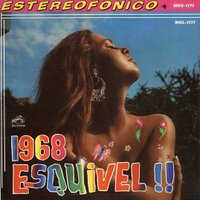
Juan Garcia Esquivel (1918-2002) é considerado por muitos o rei da Space Age Pop. E provavelmente com justiça, pois falamos de um talentoso compositor, arranjista, maestro, performer... enfim, um prodígio nato no mundo do espectáculo e, em particular, na criação de sonoridades que ajudaram a definir este rumo tão próprio que algumas big bands tomaram por volta da década de 60.
Com a Space Age - e com Esquivel em particular - afastamo-nos da imagem e dos swings nostálgicos das big bands do tempo da II Guerra Mundial, como a do eminente Glenn Miller, para entrarmos num elenco orquestral que, para além do piano e dos sopros incorpora sons ondulantes de slide guitar, percussões primitivas, guitarras mariachi ou até instrumentos orientais, entre outros mais bizarros, como a buzzimba. Além disso, e assumindo ainda mais a ruptura com as big bands tradicionais, Esquivel aventura-se na integração de intrumentos electrónicos, como o Theremin (quem não se lembra dos sons fantasmagóricos em Spellbound/A Casa Encantada de Hitchcock?) ou o Ondioline, um teclado electrónico com sons fora do vulgar. A tudo isto juntam-se os arranjos com grandes e por vezes súbitas oscilações de volume, a separação estereofónica dos instrumentos - por vezes com "danças" entre o canal esquerdo e o direito - e as vocalizações quase sem palavras, que ele próprio inventou (os "zu-zu-zu" e "pow! pow!" de Esquivel são tão ou mais célebres do que os "pa-pa-pa" de Hugo Montenegro),
Todos estes ingredientes mostram o génio de um artista que dignifica o conceito mais genérico de lounge music (sob o qual cabem os sub-géneros de Space Age Pop, Exotica, etc.), afastando este género das definições mais empobrecedoras de música ambiente ou de elevador, e a música de Esquivel pertence, de facto, a uma dimensão mais espacial. Aliás, apesar da origem Mexicana do compositor, não é negada a possibilidade de sangue marciano a correr nas suas veias. Quando uma noite, após uma actuação em São Francisco, o proprietário de um clube lhe perguntou de onde ele era, Esquivel respondeu com un sorriso irónico "Algumas pessoas dizem que sou de Marte."
Pode ouvir aqui 3 temas do álbum Other Worlds Other Sounds.
Juan Garcia Esquivel (1918-2002) is considered by many as the king of Space Age Pop. And they’re probably right, since we’re talking about a gifted composer, arranger, conductor, performer... in one word, a natural-born prodigy in the show industry and, particularly, in the creation of sounds that helped define this unique route that a number of big bands took around the sixties.
With Space Age – and with Esquivel in particular – we move away from the image and the nostalgic swings of World War II big bands, like that of the distinguished Glenn Miller, to enter into an orchestral set that, besides the piano and the brass section, includes waving sounds of slide guitar, primitive percussions, mariachi guitars or even oriental instruments, among more bizarre ones, like the buzzimba. Moreover, and proceeding even further with the rupture with the traditional big bands, Esquivel ventures into the add-on of electronic instruments, like the Theremin (who doesn’t remember the spooky sounds in Hitchcock’s Spellbound?) or the Ondioline, an electronic keyboard with unusual sounds. In addition, there are the arrangements with great and sometimes sudden volume oscillations, the stereophonic separation of the instruments – sometimes with "dances" between the left and right channels – and the vocal arrangements with almost no words, which are his own invention (Esquivel’s "zu-zu-zu" and "pow! pow!" are as famous as – or more famous than - Hugo Montenegro’s “pa-pa-pa”).
All these ingredients show the genius of an artist that dignifies the broader concept of lounge music (under which the subgenres of Space Age Pop, Exotica, etc. are usually fit), moving this genre away from the more downgrading definitions of ambience or elevator music, and Esquivel’s music belongs, indeed, to an outer space dimension. Actually, despite the Mexican origin of the composer, the possibility of Martian blood running in his veins can’t be denied. When one night, after a performance in San Francisco, the owner of a club asked him where he was from, Esquivel replied, with an ironic smile, ‘some people say I’m from Mars.’
You can listen to 3 tracks from the album Other Worlds Other Sounds here.
(Almost) complete discography (including compilations):
Las Tandas de Esquivel, RCA Victor, 1956 (Mexico) MKL 2001
Actual!, RCA Victor (Mexico) MKL-1710
To Love Again, RCA Victor, 1957, LPM-1345
Other Worlds, Other Sounds, RCA Victor, 1958, LSP-1753
Four Corners of the World, RCA Victor, 1958, LSP-1749
Exploring New Sounds in Hi-Fi, RCA Victor, 1959, LPM-1978 ("In Stereo" on LSP-1978)
Strings Aflame, RCA Victor, 1959, LSP-1988
(with the Ames Brothers) Hello Amigos, RCA Victor, 1960, LSP-2100
Infinity in Sound, RCA Victor, 1960, LSP-2225
Infinity in Sound, Vol. 2, RCA Victor, 1961, LSP-2296
Latin-esque, RCA Victor, 1962, LSA-2418
as Living Strings, In A Mellow Mood, RCA Camden CAL/CAS-709
More of Other Worlds and Other Sounds, Reprise, 1962, RS-6046
The Best of Esquivel, RCA Victor LSP-3502
The Genius of Esquivel, RCA Victor, 1967, LSP-3697
Burbujas, (?)1978 (Mexico) themes from children's TV puppet show "Burbujas"
Odisea Burbujas, same as above
Space Age Bachelor Pad Music, Bar/None, 1994, CD
Cabaret Manana, RCA/BMG. 1995, CD
Music from a Sparkling Planet, Bar/None, 1995, CD
Exploring New Sounds in Stereo/Strings Aflame, Bar/None, 1997, CD
Other Worlds, Other Sounds/Four Corners of the World, Bar/None, 1997, CD
Infinity in Sound, Vols. 1 & 2, Bar/None, 1997, CD
Merry Xmas From The Space-Age Bachelor Pad, Bar/None, 1996, CD
See It in Sound!, BMG/Buddah CD, 1999, CD
Loungecore, BMG Camden, 1999, CD








2 comments:
I knew that Esquivel was a bit of an alien... Now I understand why!
Acho que vais gostar deste link http://scarstuff.blogspot.com/
Post a Comment